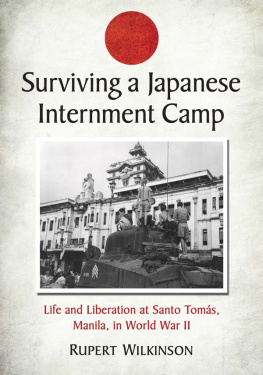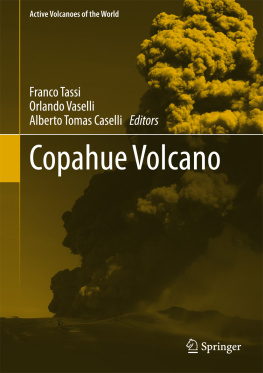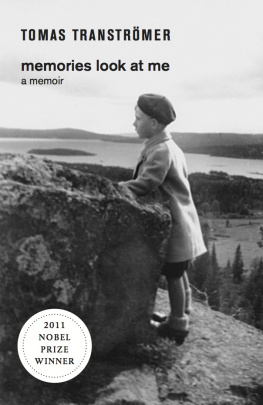Barajima Books 2020, all rights reserved. No part of this publication may be reproduced, stored in a retrieval system or transmitted by any means, electrical, mechanical or otherwise without the written permission of the copyright holder.
Publishers Note
Although in most cases we have retained the Authors original spelling and grammar to authentically reproduce the work of the Author and the original intent of such material, some additional notes and clarifications have been added for the modern readers benefit.
We have also made every effort to include all maps and illustrations of the original edition the limitations of formatting do not allow of including larger maps, we will upload as many of these maps as possible.
THE DRAINPIPE DIARY
My Internment at Santo Tomas
TRESSA R. CATES, R.N.
The Drainpipe Diary was originally published in 1957 by Vantage Press, New York.
* * *
To all prisoners of war, living and dead, this book is humbly dedicated
Foreword
Today from our home in the Santa Barbara foothills, my eyes take in a scene of wondrous serenity. The velvet green of carefully tended lawns, complemented by low and rambling pastel-colored houses. Red and green roofs. High terraces with multicolored ivy geraniums in such magnificent profusion that one is reminded of the Garden of Eden.
On a clear day, as far as the eye can see, there is the ever changing blue of the Pacific.
In the back of our home are the purple-shadowed mountains that seem close enough to touch. Below these same magic mountains, the tall grass undulates slowly with the breeze and the wild mustard dots the hills with gay patches of sunshine.
Horses graze peacefully all day in the lush grass, and the quiet of the day is broken by their loud neighing and the gleeful voices of happy children playing.
Here there is freedom; also happiness, peace, love, and security, just as there is everywhere in this happy land of ours. But complacency, smugness, and unpreparedness are here too, just as back in 1941.
My diary lies open before me, and its pages hold a lifetime of memories.
Bombings! Panic! Invasion and fear of the enemy, and the seemingly endless years of internment, out of which grew suspicion, prejudice, greed, hate, love, pity, self-sacrifice, sickness, and death!
This I have seen and known! This is my story of yesterday, and it could be your story today!
T.R.C.
Santo Tomas Prison Camp No. 1 Manila, P. I.
January 5, 1942
January, the 5 th ! We could never forget that date, for it would have been our wedding day! Instead of a wedding, the large iron gates of our prison slammed shut on Catesy, my fianc, and me with a finality that chilled our hearts.
What a nightmare we had lived in since Pearl Harbor! Yet there was always that one small hope that help and reinforcements would arrive before the enemy reached us.
But we waited in vain.
Bombings! Fires! Death and Destruction! Nursing the wounded! Panic and Invasion. This had been our life for the last month. Now imprisonment!
Strangely enough, Catesy and I had never given up hope that help would arrivenot until two weeks ago. That was the time we realized that escape had been cut off by land and sea.
We had driven to the piers to take a last look at our bombed ships which lay like useless driftwood in Manila Bay. The enemy had done a thorough job, as most of the ships were half-submerged, and their masts were leaning tipsily, parallel to the water.
As we gazed, sadly, at all this destruction, we recognized one of the destroyed vessels. Once it had been a sleek and beautiful freighter, and the accommodations for twelve passengers had been luxurious. Now it was a useless piece of junk.
This was the freighter that would have taken us on our honeymoon trip to Europe! But what was the use of thinking about that?
Our immediate problem was to dislodge ourselves from the crowded passenger car which had conveyed us from our homes to the prison that loomed before us.
Prisoners of the Japs! Just to repeat the phrase made one shudder.
There were six of us in the tightly packed car, and we had bundles, suitcases, and bulging pillowcases around us, between us, and on our laps. Because the Japs had instructed us to bring food for three days, we were surrounded by small and large bundles of canned food and other edibles, and our suitcases contained clothing, additional food, and some bedding.
The bulging pillowcase filled with a ten-pound wedge of rat cheese, two huge boxes of crackers, and other food items, on my lap, was in danger of splitting.
I had to stretch my short neck to see above the mound on my lap. I turned and smiled at Catesy, and he squeezed my hand in a reassuring manner. Thank God, we were together!
Catesy was dark-haired and handsome, but of course I would be prejudiced. His most outstanding traits were congeniality and kindness, and like most people with an Irish and Welsh background he had a sly and droll wit. He had his faults, too, like anyone else. He had a hot temper which flared up as suddenly as summer thunder and disappeared just as quickly. After one of these temper flare-ups, he was as meek and contrite as a small boy who had been caught red-handed stealing apples.
For the past eight years he had been employed by one of the largest Manila wholesale-and-retail drug firms in the entire Orient.
Henry, a bachelor of forty, with sandy hair and baby-blue eyes, was the second man in our little group of six. His perpetual grin and good humor helped to lessen some of the tension of the last month. Slightly built and of medium height, he walked on his tiptoes with a bouncing gait.
For many years he had been stationed in one of the southern provinces as an employee of one of the major oil companies in the States. To him fell the job of setting fire to several million dollars worth of oil prior to the Japanese entry into Manila.
As we had watched the huge conflagration caused by this oil destruction from my sixth-floor apartment only a week ago, we had listened to ear-shattering explosions all day. Giant flames and mountains of dense smoke had hung over the city for days.
I dare the Nips to find a jiggerful of gas when they reach the city! Henrys voice, though tense and nervous, had been filled with complete satisfaction. He had followed the armys orders.
Sophie, a slender girl of twenty-five with brown hair and unusually large gray eyes, was one of the four women in our group. She was the wife of a mining engineer and, like so many others, had come to Manila to do her Christmas shopping; but because of the rapidly approaching enemy she had been unable to join her husband in the provinces. Nor had she been able to communicate with him. To add to her depression and worries, a favorite young cousin of hers, a flyer, had been killed at Clark Field about ten days before.
The other two women were mother and grown daughter, Belle and Toinette. Both were attractive, dark-haired and extremely vivacious. They had lived in the same apartment house I had, and the mother, like me, had been employed as a civilian nurse at the Sternberg General Army Hospital in Manila.














